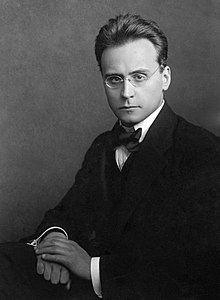
Back Anton Webern ALS أنتون فيبرن Arabic انتون ويبيرن ARZ Антон Веберн Byelorussian Антон Веберн Bulgarian Anton Webern BJN Anton Webern Catalan Anton Webern Czech Anton Webern Welsh Anton Webern Danish
Anton Webern | |
|---|---|
 Webern in Stettin, October 1912 | |
| Born | 3 December 1883 |
| Died | 15 September 1945 (aged 61) |
| Occupations |
|
| Works | List of compositions |
| Signature | |
Anton Webern[a] (German: [ˈantoːn ˈveːbɐn] ; 3 December 1883 – 15 September 1945) was an Austrian composer, conductor, and musicologist. His music was among the most radical of its milieu in its concision and use of then novel atonal and twelve-tone techniques in an increasingly rigorous manner, somewhat after the Franco-Flemish School of his studies under Guido Adler. With his mentor Arnold Schoenberg and his colleague Alban Berg, Webern was at the core of those within the broader circle of the Second Viennese School.
Webern was arguably the first and certainly the last of the three to write music in a style that was both expressionist and aphoristic, reflecting his instincts and the idiosyncrasy of his compositional process. He treated themes of loss, love, nature, and spirituality, working from his experiences. Unhappily peripatetic and typically assigned light music or operetta in his early conducting career, he aspired to conduct what was seen as more respectable, serious music at home in Vienna. Following Schoenberg's guidance, Webern attempted to write music of greater length during and after World War I, relying partly on the structural support of texts in many Lieder.
He rose as a choirmaster and conductor in Red Vienna with David Josef Bach's support, championing Gustav Mahler's music at home and abroad. With a publication contract through Emil Hertzka at Universal Edition and Schoenberg away in Berlin, Webern began writing music of increasing confidence, independence, and scale using twelve-tone technique. He maintained his "path to the new music" while marginalized as a "cultural Bolshevist" in Fascist Austria and Nazi Germany, enjoying some international recognition but relying more on teaching[b] for income. Struggling to reconcile his loyalties to his divided friends and family, he adopted an optimistic outlook on the future under Nazi rule that wore on him as it proved wrong, and he repeatedly considered emigrating.
A soldier shot and killed Webern in an apparent accident shortly after World War II in Mittersill. His music was then celebrated by composers who took it as a point of departure in a phenomenon known as post-Webernism, closely linking his legacy to serialism. Musicians and scholars like Pierre Boulez, Robert Craft, and Hans and Rosaleen Moldenhauer studied and organized performances of his music, establishing it as modernist repertoire. Broader understanding of his expressive agenda, performance practice, and complex sociocultural and political contexts lagged. A historical edition of his music is currently in progress.
- ^ Moldenhauer and Moldenhauer 1978, 283.
- ^ Krones 2007, Biographie, 1914–1933.
- ^ Shaftel 2000, iii.
- ^ Kolneder 1968, 184–186; Moldenhauer and Moldenhauer 1978, 465–466, 679n16, 685n20, 686n30, 762.
- ^ Moldenhauer and Moldenhauer 1978, 237.
- ^ Moldenhauer and Moldenhauer 1978, 398, 443, 450, 481, 507, 509–510, 685n23.
- ^ Moldenhauer and Moldenhauer 1978, 596.
- ^ Moldenhauer and Moldenhauer 1978, 449, 539–543.
- ^ Moldenhauer and Moldenhauer 1978, 509–510, 674–675n1, 685n24.
- ^ Moldenhauer and Moldenhauer 1978, 92, 450, 554–555, 640, 684n12.
- ^ Moldenhauer and Moldenhauer 1978, 465, 688n5.
- ^ Moldenhauer and Moldenhauer 1978, 18, 471, 503, 519, 524.
- ^ Moldenhauer and Moldenhauer 1978, 511–513, 684n12, 685n26.
- ^ Moldenhauer and Moldenhauer 1978, 376, 506, 685n21.
- ^ Moldenhauer and Moldenhauer 1978, 106, 237, 257, 288, 299, 397, 454, 480.
Cite error: There are <ref group=lower-alpha> tags or {{efn}} templates on this page, but the references will not show without a {{reflist|group=lower-alpha}} template or {{notelist}} template (see the help page).